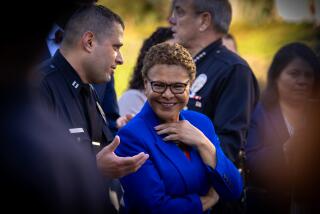Overhaul of Police Advisory Panels Urged
A report to the Los Angeles Police Commission on Tuesday recommended that community police advisory boards--one of the linchpins of community-based policing--be reorganized and strengthened to improve their participation in the LAPD.
The report, which was compiled by the commission’s staff, found that the quality of input from the 18 civilian panels varies significantly throughout the city, with some making valuable contributions to the LAPD while others founder.
The commission did not act on the recommendations because Chief Bernard C. Parks said he is concerned about some of the proposed changes and asked for more time to study the matter and provide a response to the board. Several advisory board members said they supported many of the recommendations, but also wanted to provide additional information to the commission and the LAPD before changes are adopted.
Parks told police commissioners at their regularly scheduled meeting Tuesday that he thought some of the report’s recommendations “run counter to the original purpose” of the advisory boards and cautioned that more structure did not necessarily mean more substance of dialogue. Joseph Gunn, the commission’s executive director, said he disagreed with the chief’s assessment of the recommendations.
On another front, Parks’ commitment to community policing was sharply questioned by members of the City Council who asked him to reevaluate his decision to put community liaison officers--also known as senior lead officers--back on patrol.
Councilman Hal Bernson said that since Parks has been chief he “has virtually decimated our Neighborhood Watch program. He refuses to listen to the people of the district and the council members who represent them, who have said that the senior lead officers have been responsible for keeping their Neighborhood Watch program together.”
The council ordered LAPD officials to provide a detailed report on the implementation of community policing programs. The report is to include a detailed explanation of training programs, a survey of the community and a plan for expanding the activities of Neighborhood Watch groups. “We have a long way to go before we can look the public in the face and say we have fully implemented community policing,” Councilwoman Laura Chick said.
The Police Commission, meanwhile, gave Parks until Sept. 15 to provide a response to the panel’s report on the community police advisory board matter.
Although LAPD officials, including Parks, said they recognize that changes need to be made, they are concerned that sweeping changes might undermine the boards’ current relationship with the department.
The community advisory panels, which were created in 1993, are supposed to work with the captains of neighborhood police stations to identify and solve crime problems and other quality of life issues. They are considered a key element in the department’s effort to form a policing partnership with the community. However, because the local captains select the boards’ members, some critics have compared the boards to booster clubs for the LAPD.
Among other findings, the commission’s seven-page report concluded that members of the advisory panels are not adequately trained for their roles, and “do not consistently reflect the area’s population.”
Additionally, there are no uniform rules or bylaws governing the advisory board meetings. In many areas, the actions of the advisory boards are subject to their captain’s veto. Also, the boards generally did not have materials, such as agendas, available in other languages for members or visitors. Some boards, in fact, felt that public attendance at their meetings might inhibit the productivity of the panels, according to the report, which drew upon interviews with members of the civilian advisory boards.
Gunn said the advisory panels need more structure to bolster their effectiveness. He said standardized rules and bylaws would help.
More to Read
Sign up for Essential California
The most important California stories and recommendations in your inbox every morning.
You may occasionally receive promotional content from the Los Angeles Times.









